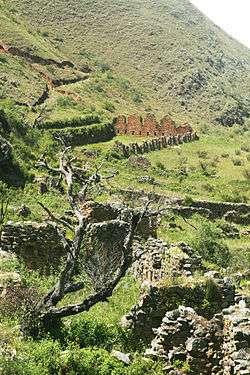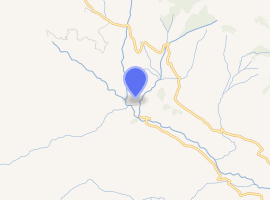Inkallaqta
Inkallaqta (Quechua inka Inca, llaqta place (village, town, city, country, nation),[1] "Inca place", Hispanicized spellings Incallacta, Incallajta, Incallakta, Inkallajta, Inkallakta) is a monumental Inca site in central Bolivia. It is located in the Cochabamba Department, Carrasco Province, Pocona Municipality, approximately 130 kilometers east of Cochabamba. It was most recently excavated by Larry Coben.[2]He believes that the site was used to perform rites for the ceremonial calendar. The site has several important structures such as the Kallanka. It was the largest single roofed room in the western hemisphere when it was built, and measures 78 by 25 meters. There's also an ushnu or a ritual platform on the site. The Torreon of Inkallaqta is also located on this site. Located at the western side of the site this six sided structure supposedly had calendrical or astronomical significance. There is a zigzag wall immediately north of the site which is meant to mark and protect it. [3]
| Inkallaqta | |
|---|---|
 | |

| |
| General information | |
| Location | Cochabamba Department |
| Country | Bolivia |
| Coordinates | 17°36′18″S 65°24′57″W |
World Heritage Status
This site was added to the UNESCO World Heritage Tentative List on July 1, 2003 in the Cultural category.
Opera
There is also an opera called "Incallajta" in honor of these ruins. The libretto was written by Norma Méndez de Paz, the music composed by Atiliano Auza León. It is the first Bolivian opera. The premiere was in La Paz, Bolivia in 1980. It will have its reinstatement in September 2010, in Cochabamba, in honor to the Bicentenary of this city. Gastón Paz Zegarra, recognized Bolivian baritone represented the role of Sovereign Inca, role that will repeat in the new version of this opera.
Sources
- Teofilo Laime Ajacopa, Diccionario Bilingüe, Iskay simipi yuyayk'ancha, Quechua – Castellano, Castellano – Quechua, La Paz 2007 (Quechua-Spanish dictionary): inka. s. Soberano, monarca, supremo jerarca del Tawantinsuyu. llaqta - s País. Nación, región, provincia o territorio, pueblo pequeño. || s. Nación. Conjunto de los habitantes de un territorio. || s. Patria. Lugar, ciudad o país en que se ha nacido. || s. Pueblo. || s. Urbe. Ciudad, en especial populosa.
- larrycoben.com Larry Coben Archaeology Web Page "Incallajta (Inkallajta, Incallacta, Inkallakta), Bolivia", retrieved on June 27, 2013
- "Larry Coben Archaeology Web Page - Inca Archaeology and Archaeology of Performance". 2006-10-16. Archived from the original on 2006-10-16. Retrieved 2018-05-14.
External links
- Proyecto Inkallakta
- Incallajta, the largest Inca site in the Kollasuyo - UNESCO World Heritage Centre Retrieved 2009-03-23.